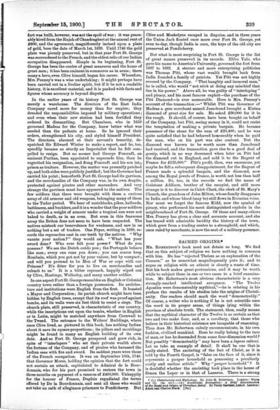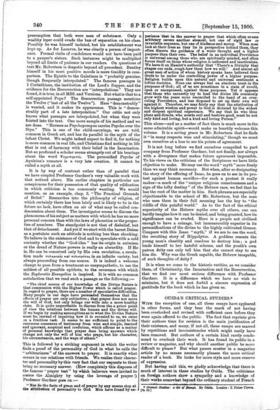SACRED ORIGINS.*
MR. ROBERTSON'S book need not detain us long. We find that on this subject of religion we have nothing in common with him. He has " rejected Theism as an explanation of the Cosmos," as he somewhat magniloquently puts it; and to argue on religion with an atheist is clearly a waste of time. But his book makes great pretensions, and it may be worth while to subject these in one or two cases to a brief examina- tion. Mr. Robertson's most obvious characteristic is a very strongly-marked intellectual arrogance. " The Twelve Apostles were demonstrably mythical,"—he is relating in his preface the results of his studies into the origins of Christi- anity. Our readers should mark the word " demonstrably." Of course, a writer who is nothing if he is not scientific uses the word in its proper sense, of things lying within the province of absolute truth. The statement, then, really means that the mythical character of the Twelve is as certain as that two and two make four, and, as a corollary, that those who believe in their historical existence are incapable of reasoning. Thus does Mr. Robertson calmly excommunicate, in his own fashion, civilized mankind. Does he really belong to the race of man, or has he descended from some four-dimension world ? But possibly " demonstrably " may have been a ktpsua calansi. Let us take an example of detail. It shall be one that is easily stated. The anointing of the feet of Christ, as it is told by the Fourth Gospel, is "false on the face of it, since it represents a pauper household as possessing a peculiarly costly and useless article." Why " pauper household" P It is doubtful whether the anointing took place in the house of Simon the Leper or in that of Lazarus. There is a strong * (1.) Chriatianity and Mythology. By John 3.1. Robertson. London : Watta and Co. (8s. ed.]—(2.) Exploratio Everagelica: a Brief Examination Ithe Basis and Origin of Christian Bow. By Percy Gardner, LItt.D. London: dam and Charles Black. [158.]
presumption that both were men of substance. Only a wealthy leper could evade the ban of separation on his class. Possibly he was himself isolated, but his establishment was kept up. As for Lazarus, he was clearly a person of import- ance. Formal visits of condolence would not have been paid to a pauper's sisters. Such instances might be multiplied beyond all limits of patience in our readers. On questions of text Mr. Robertson is despotic beyond all precedent. Bentley himself in his most positive moods is mere timidity in com- parison. The Epistle to the Galatians is " probably genuine, though frequently interpolated." The famous passages in 1 Corinthians, the institution of the Lord's Supper, and the evidence for the Resurrection are "interpolations." They are found, it is true, in all MSS. and Versions. But what is that to a self-appointed Pope P The Resurrection passage mentions the Twelve ("last of all the Twelve"). Here "demonstrably" is wanted, and it makes its appearance. This is " demon- strably part of a late interpolation." Our critic not only knows what passages are interpolated, but when they were foisted into the text. One more sample of his method and we are done. " Hermes as Psychopompus carries Psyche over the Styx." This is one of the child-carryings, we are told, common in Greek art, and has its parallel in the myth of the infant Christ. We might indeed expect to find it, for nothing is more common in real life, and Christians find nothing in life that is out of harmony with their belief in the Incarnation. But so profound a scholar seems strangely out of his bearings about the word Tux° Toe.74. The personified Psyche of Apuleius's romance is a very late creation. It cannot be called a myth at all.
It is by way of contrast rather than of parallel that we have coupled Professor Gardner's very valuable work with that noticed above. His earlier chapters in particular are conspicuous for their possession of that quality of edification in which criticism is too commonly wanting. We would mention, as an example, chap. 3, " The Practical Grounds of Belief." Researches into the philosophy of religion, of which certainly there has been lately and is likely to be in the future no lack, have often an air of what may be called con- descension about them. The investigator seems to discuss the phenomena of his subject as matters with which he has no more personal concern than with the laws of phonetics or the proper- ties of numbers. The standpoint is not that of disbelief, but that of detachment. And yet if we start with the barest Deism as a postulate such an attitude is nothing less than shocking.
To believe in the existence of God and to speculate with a cold curiosity whether the " God-idea " has its origin in animism
or the dread of Nature powers is really an absurdity. If He is, He can be conceived only by His own revelation, a revela- tion made TroXv,etpcli; ;cal TroXvrpOired; in an infinite variety, but
always proceeding from one source. It is indeed a welcome change to pass from a treatment so unsympathetic, to use the mildest of all possible epithets, to the reverence with which the Exploratio Evangelica is inspired. It is with no common satisfaction that we read such a passage as the following :—
"The chief source of our knowledge of the Divine Nature is that communion with the Higher Power which is called prayer. In regard to prayer, there are a number of speculative difficulties. Many people in our days have persuaded themselves that the effects of prayer are only subjective ; that prayer does not move the will of G od, but only brings our wills into a more healthy state. It is quite unprofitable to discuss from the a priori point of view the relations between the human and the divine will. If we begin by making assumptions as to what the Divine Nature must be, instead of inquiring how it is revealed to us, we enter an a fruitless task. It seems to me sufficient to point to the enormous consensus of testimony from wise and simple, learned and ignorant, sceptical and credulous, which affirms as a matter of personal knowledge that prayer does bring answers which change not only the will of him who prays, but his character, his circumstances, and the ways of others."
This is followed by a striking argument in which the writer finds a proof of the personality of God in what he calls the " arbitrariness" of the answers to prayer. It is exactly what occurs in our relations with friends. We realise their charac- ter and personality by this very fact that our requests to them bring no necessary answer. (How completely this disposes of
the famous " prayer test " by which believers were invited to coerce the Almighty by using the leverage of prayer !) Professor Gardner goes on :-
" Nor do the facts of grace and of prayer by any means stop at the attribution of personality to God. Men have found by ex-
perience that in the answer to prayer that which often se ems arbitrary covers another element, not one of rigid law or invariable sequence, but one of kindness and mercy. When men look at their lives as they lie in perspective behind them, they often discern the guidance of a wiser thought and a higher purpose than their own. The belief in an individual Providence is universal among those who are spiritually minded, and often forces itself on those whose religion is unformed and inarticulate. We have it on Hamlet's authority that There's a Divinity that shapes our ends, rough-hew them how we will.' And almost all great men of action of whom history speaks have believed their deeds to be under the controlling power of a higher purpose. Religion builds upon this natural and universal sentiment a loftier doctrine. None can always feel an absolute trust in the purposes of God ; all of us are sometimes in a state of revolt, open or unexpressed, against those purposes. Yet it appears that those who earnestly try to lead the divine life commonly grow with the years more reconciled to the hand of an over- ruling Providence, and less disposed to set up their own will against it. Therefore, we may fairly say that the attribution of the highest wisdom and power to God is dictated by the widest and deepest spiritual experience. We say that he who thus plans and directs, who averts evil and bestows good, must be not only kind and loving, but a kind and loving Person."
This alone—and as a matter of fact there is much more in the same admirable spirit—would make us heartily welcome this volume. It is a saving grace in Mr. Robertson that he finds
it " in many respects wise and stimulating," though we must own ourselves at a loss to see his points of agreement.
It is not long before we find ourselves compelled to part company from Professor Gardner, but not finally, nor always with a divergence that makes future agreement impossible. To his views on the criticism of the Scriptures we have little objection to make. He may use the word " myth" more freely than we may think necessary. But when, after so designating the story of the offering of Isaac, he goes on to see in its pro- test against human sacrifice—for such a protest it really makes—a mark of the "unique religious consciousness and a sign of the lofty destiny " of the Hebrew race, we feel that he has the root of the matter in him. Such phrases are especially objectionable to the school of Mr. Robertson, but the man who uses them in their full meaning has the key to " the riddle of this painful world." As to the fact of the ethical superiority of the Hebrew myths over all others, one can hardly imagine how it can be denied, and being granted, how its significance can be evaded. Here is a people not civilised enough to have a coinage, but immeasurably superior in its personifications of the divine to the highly cultivated Greece.
Compare with this Isaac " myth," if we are to use the word, the revolting story of Hippolytus. A goddess resents the young man's chastity and resolves to destroy him ; a god lends himself to her hateful scheme, and the youth's own patron deity can only tell him that she cannot stay to see him die. Why was the Greek capable, the Hebrew incapable, of such thoughts of deity P It is when we come to the historic verities, as we consider them, of Christianity, the Incarnation and the Resurrection, that we find our most serious difference with Professor Gardner. It is a difference which we have no wish to minimise, but it does not forbid a sincere expression of gratitude for the book which he has given us.







































 Previous page
Previous page